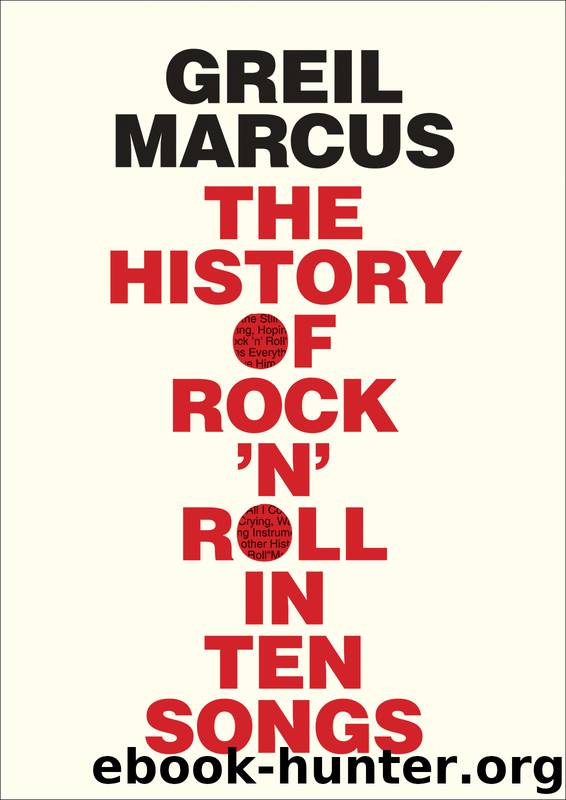History of Rock 'n' Roll in Ten Songs by Greil Marcus

Author:Greil Marcus
Language: eng
Format: epub
Publisher: Yale University Press
Published: 2014-12-28T16:00:00+00:00
Money (That’s What I Want)
1959 • 1963
Money Changes Everything
1978•1983•2008•2005
All rock ’n’ roll songs about money, from the Drifters’ “Money Honey” to Rubella Ballet’s punk chant “Money Talks”—“In this / corrupt / society,” Zillah Minx sings, breaking each word and each idea into its own line, “the rich / pay / to be free”— and on from there flow into Barrett Strong’s “Money (That’s What I Want)” or out of it. It was Berry Gordy’s first hit on his own label; as Raynoma Gordy Singleton, his second wife and first partner in the enterprise that would become known as Motown Records, put it, with that song “we were really starting to be in the money.” That was the meaning of the song as business. As something in the air, it wrote a bigger story: “Its immediate impact,” Singleton said, “would be nothing compared to what it would do over the course of the decades to come.”
Berry Gordy was born in Detroit; by 1959, just short of thirty, after dead-end careers as a boxer and a record store owner, he was making it as a songwriter. In 1957, along with his sister Gwen Gordy and the Chess staff writer Billy Davis, he’d written Jackie Wilson’s signature “Reet Petite (The Finest Girl You Ever Want to Meet),” the first of dozens of Wilson numbers to make the national charts, and a year later co-wrote Wilson’s “Lonely Teardrops,” his first top ten hit. With Davis and Gwen he wrote Etta James’s “All I Could Do Was Cry”—the three of them knowing, as James didn’t, that her boyfriend, Harvey Fuqua of the Moonglows, was already deep into an affair with Gwen. The two were married the year after the record came out; when James said the song had played her for a fool, that was what she meant.
In Detroit, Berry’s sister Anna already had her own label, Anna Records; Gordy and the then Raynoma May-berry started Tamla. They named it for Debbie Reynolds’s “Tammy”: “We all really liked Debbie and that song,” Raynoma Singleton wrote in 1990 in Berry, Me, and Motown, which some, aware of how quickly Berry Gordy’s second wife became his second ex-wife and of how completely she was written out of the Motown story, translated as “Bury Me in Motown.”
Late in 1959, Berry and Singleton watched as black, cutout cursive letters spelling “Hitsville, U.S.A.” went up over the entry to a squat two-story house on West Grand Boulevard in Detroit. “Money” was the first record made there— or discovered there. As Singleton describes it, it is a rock ’n’ roll origin story: another proof that rock ’n’ roll can be born anywhere, at any time, regardless of how many times it might have been born before.
Gordy had Barrett Strong in the studio. Born in Mississippi in 1941, he was a songwriter more than a singer; with the Motown writer Norman Whitfield he would write a cornucopia of hits, including Edwin Starr’s “War,” the Temptations’ “Just My Imagination (Running Away with Me)”
Download
This site does not store any files on its server. We only index and link to content provided by other sites. Please contact the content providers to delete copyright contents if any and email us, we'll remove relevant links or contents immediately.
The Goal (Off-Campus #4) by Elle Kennedy(12450)
Kathy Andrews Collection by Kathy Andrews(10559)
Diary of a Player by Brad Paisley(6872)
What Does This Button Do? by Bruce Dickinson(5537)
Assassin’s Fate by Robin Hobb(5255)
Big Little Lies by Liane Moriarty(4892)
Pale Blue Dot by Carl Sagan(4018)
Sticky Fingers by Joe Hagan(3459)
The Heroin Diaries by Nikki Sixx(2942)
The Death of the Heart by Elizabeth Bowen(2910)
Beneath These Shadows by Meghan March(2730)
The Help by Kathryn Stockett(2708)
Confessions of a Video Vixen by Karrine Steffans(2682)
How Music Works by David Byrne(2538)
Jam by Jam (epub)(2496)
Harry Potter 4 - Harry Potter and The Goblet of Fire by J.K.Rowling(2422)
Strange Fascination: David Bowie: The Definitive Story by David Buckley(2371)
Petty: The Biography by Warren Zanes(2241)
Darker Than the Deepest Sea by Trevor Dann(2214)
